Intro
When considering a new mountain bike, there are so many similar-looking bikes on the market being made by so many different companies, it is virtually impossible to (1) know where to begin; (2) quickly figure out which one or two products from a given brand might work well for you; and (3) determine what products from other brands might be the most similar and also worth considering.
In our “Blister Brand Guide” series, we provide an overview of the entire product lineup of a brand and highlight how each product stands out from the rest to help you find the best women’s mountain bike or men’s best mountain bike for you.
In our individual product reviews, we go very deep into the details of particular products. With these Brand Guides, the goal is not Depth, but Breadth. Our Brand Guides and full reviews are designed to complement each other — provide a broad overview of entire company lineups, and then also very detailed reviews of individual products.
And if you’re looking for a great place to start when considering a new bike — and all the factors that go into it — check out our Mountain Bike Buyer’s Guide.
Our mountain bike Brand Guides are presented by CBGTrails. Learn more and start planning your trip today at cbgtrails.com, then download the CBG Trails app for info on the 750+ miles of singletrack and 150+ trails in Crested Butte and the Gunnison Valley, Colorado.
About Rocky Mountain
Rocky Mountain has been making mountain bikes since 1981. They also started Race Face Bicycle Components in 1993. Both brands have had great success in the mountain bike industry since. Today, Rocky Mountain only makes mountain bikes, from cross-country to freeride options, and they offer certain models in both alloy and carbon frames.
Rocky Mountain uses “Ride-9” geometry adjustment system on many of their bikes, which consists of two flip chips that allow for nine different geometry positions on their full-suspension bikes. Changing the Ride-9 position also slightly tweaks the suspension kinematics. They also use “Ride-4,” a similar system with only 4 positions. All full-suspension Rocky Mountain bikes also feature a size-specific shock tune, meaning that smaller size bikes get lighter-weight-oriented tunes, and vice versa.
Rocky Mountain has discontinued their 27.5” trail bike, Thunderbolt, for model year 2022. This model can be found in our 2021 Rocky Mountain Bike Brand Guide.
They are currently based in Vancouver, British Columbia, Canada.
Current Warranty (for the original owner)
- Five year warranty for all carbon fiber and aluminum mountain bike frames
- One year for paint, decals, pivots, bushings, and frame hardware
- For more information, visit Rocky Mountain.
Rocky Mountain’s suspension design: Smoothlink
Before we get into their specific models and build options, here are some things to keep in mind when deciding on which build level to go with, and why. You can find more detailed thoughts about this (and many other things to consider when buying a bike) in our Mountain Bike Buyer’s Guide.
First, when looking at complete bikes, suspension and wheels are going to make the biggest difference in how a bike really rides. Spend money on those before other things like higher-end drivetrain parts, cockpit parts (e.g., stem, handlebars, etc.), cranks, etc.
Tires make an enormous difference in performance, but are cheaper and easier to upgrade, especially since they tend to wear down quicker than other components. Upgrading a lower-end front tire to something better — and saving the original for rear-tire use — can be a good way to improve a bike while still making use of the originals, since front tires are generally a lot more important than rear tires when it comes to traction.
Drivetrain parts can be upgraded piecemeal as they wear out, or if you just want to upgrade down the line. Higher-end cassettes are mostly just lighter, while higher-end shifters and derailleurs get lighter, smoother, and sometimes last a bit longer as you go up in price.
We’ll outline here the different models in Rocky Mountain’s MTB lineup, organized from most cross-country-oriented (XC) to downhill-oriented (DH). In other words, the bikes at the top of the list are optimized to pedal and climb uphill very well, while the bikes at the bottom are optimized to handle very rough, steep, and challenging descents very well.
We’ve included some notable information for each model:
Available build kits & their MSRP
- Best Budget Build: These are the build kits that we think make the most sense for people trying to spend the least amount without ending up with a build that’s going to immediately break or need to be upgraded.
- Most Performance for the Price: These are the build kits that we think make the most sense for people seeking the best balance of performance and cost. I.e., if you don’t need to get the cheapest bike, but you also don’t need the absolute lightest bike or all the newest bling, this is the build we think makes sense for you.
- Suspension travel (e.g., 100 mm of travel, 130 mm of travel, etc.)
- Wheel size (e.g., 27.5”, 27.5+, 29”)
- Frame material options (e.g., alloy vs. carbon)
- Sizes available and height range accommodated for by those sizes
- A brief description of what the bike was designed for and any notable design details.
- Some of the bike’s most direct competitors from other brands
- Which Rocky Mountain bike it’s most similar to
- Reasons why you should buy it
- Reasons why you should not buy it
Rocky Mountain's Mountain Bikes
(Most Cross-Country-Oriented to Most Downhill-Oriented)
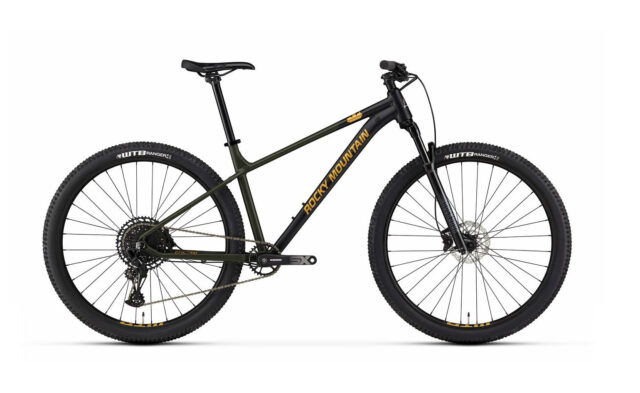
- Front: 100 mm
- Rear: Hardtail
- 29"
- Alloy
- SM, MD, LG, XL (5’3”-6’6” / 165-198 cm)
Rocky Mountain’s entry-level sport XC bike (i.e., not racing oriented), ideal for beginners or those who prioritize low price over top-of-the-line components, low weight, and performance.
Consider If:
- You are a beginner looking to get into the sport
- You plan to ride mellow, smooth trails
- You are looking for a bike that could double as a commuter
- You are on a budget
You Have Better Options If:
- You plan on riding steep, technical, and bumpy trails
- You want a bike that is forgiving on descents
- You are willing to spend some more money for more overall performance
- 10: $909
- 30: $1,069
- 40: $1,439 – Best Budget Build & Most Performance for the Price
- Specialized Chisel & Rockhopper
- Scott Aspect
- Kona Kahuna
- Trek X-Caliber
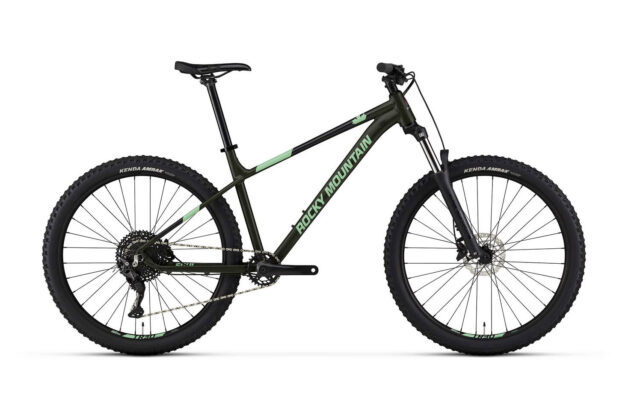
- Front: 120 mm
- Rear: Hardtail
- 27.5"
- Alloy
- XS, SM, MD, LG (5’0”-6’2” / 152.5-188 cm)
This entry-level Trail hardtail is a solid option for beginners on a tight budget looking for 27.5” wheels.
More like the Fusion than the Element.
Consider If:
- You are a beginner looking to get into the sport
- You plan to ride mellow, smooth trails
- You are looking for a bike that could double as a commuter
- You are on a budget
You Have Better Options If:
- You plan on riding steep, technical, and bumpy trails
- You like a bike that is forgiving on descents
- You are willing to spend some more money for more overall performance
- 10: $909
- 20: $1,019 – Best Budget Build
- Specialized Fuse 27.5” & Rockhopper 27.5”
- Kona Fire Mountain
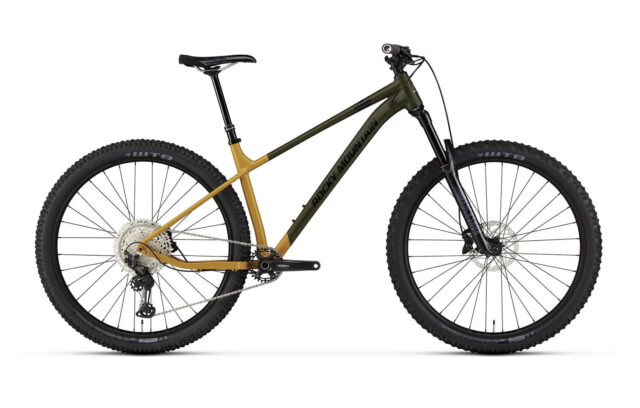
- Front: 130-150 mm
- Rear: Hardtail
- 29"+
- Alloy
- SM, MD, LG, XL (5’2”- 6’6”/ 157.5-198 cm)
The Growler can inspire confidence on loose trails thanks to its wide 2.6” x 29″ tires. It comes with a 130 mm fork on the “20” build, a 140 mm fork on the “40” build, and a 150 mm fork on the “50” build. This bike is a great choice for beginners and those on a tight budget who want something with higher-end components and more downhill-capable geometry than the Fusion and Soul.
More like the Element than the Soul.
Consider If:
- You appreciate hardtails, but want one that has slightly more aggressive geometry
- You are a beginner looking for a confidence-inspiring bike
- You ride trails that have loose surfaces
- You are on a budget
You Have Better Options If:
- You often ride very steep, fast, technical, bumpy trails
- You like a bike that is more forgiving on descents than it is a good climber
- You are looking for a lightweight, XC race-style hardtail
- You are willing to spend more money for more overall performance
- 20: $1,399
- 40: $1,799
- 50: $2,199 – Best Budget Build & Most Performance for the Price
- Santa Cruz Chameleon 29”
- Kona Big Honzo
- Devinci Kobain HT
- Trek Roscoe
- Nukeproof Scout 290
- Giant Fathom 29
- Canyon Stoic
- Marin El Roy
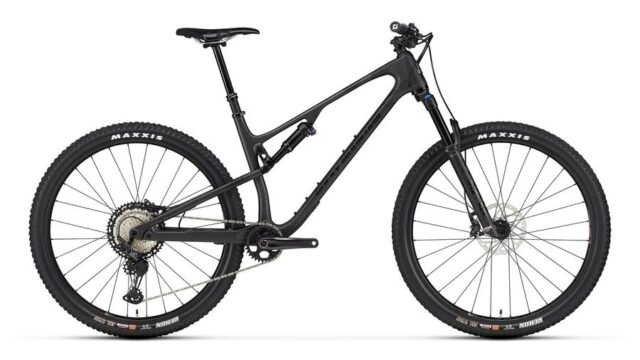
- Front: 130 mm
- Rear: 120 mm
- 29" (27.5" on size XS)
- Alloy or Carbon
- XS, SM, MD, LG, XL (4’8”-6’6” / 142.5-198 cm)
Updated in September 2021, the Element underwent some serious changes. The new Element now features more travel front and back, a dramatically slacker head tube angle, and an overall more downhill-capable design, straying a ways from its purebred XC roots. Features Ride-4 geometry adjustment system.
More like the Instinct than the Growler.
Consider If:
- You like a full-suspension bike that climbs well
- You want a downhill-capable, short-travel 29er
- You like a bike that is more efficient than it is forgiving
You Have Better Options If:
- You’re looking for a XC-race-style full-suspension 29er
- You are willing to sacrifice some climbing ability for more descending capability
- Alloy 10: $2,559
- Alloy 30: $3,089 – Best Budget Build
- Alloy 50: $4,049
- Carbon 30: $4,259
- Carbon 50: $4,899
- Carbon 70: $6,819 – Most Performance for the Price
- Carbon 90: $9,589
- Carbon Frameset: $3,199
- Transition Spur
- Trek Top Fuel & Fuel EX
- Scott Spark
- Santa Cruz Tallboy
- Ibis Ripley & Ripley AF
- Devinci Django 29
- Giant Trance 29
- Yeti SB115
- Pivot Mach 4 SL
- Kona Hei Hei
- Cannondale Scalpel SE
- YT Izzo
- Revel Ranger
- Norco Optic
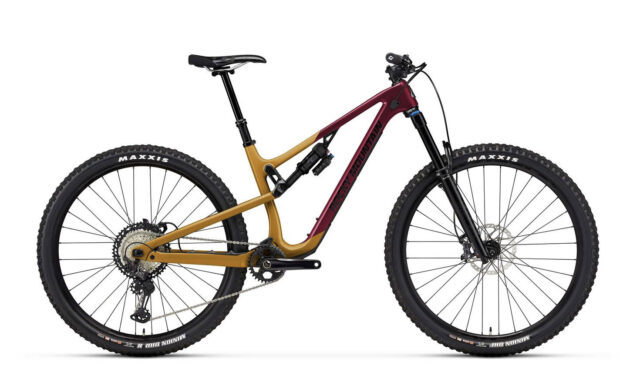
- Front: 150 mm
- Rear: 140 mm
- 27.5” (sizes XS and S) or 29” (sizes S-XL)
- Carbon or Alloy
- XS, SM, MD, LG, XL (4’8”- 6’6”/ 142.5-198 cm)
Updated March 2021, the new Instinct is Rocky Mountain’s best Quiver Killer. The updated Instinct has longer and slacker geometry, features an adjustable chainstay length, and has updated suspension kinematics. This bike shares the same frame as the Altitude with a different front shock mount. Features Ride-9 geometry adjustment system.
More like the Altitude than the Element.
Consider If:
- You’re looking for a do-it-all Trail bike
- You appreciate a good, fast, technical, and / or steep descent, and are willing to climb for it
- The trails you ride are rocky, rooty, fast, steep, and technical
- You like a bike that is well-rounded in terms of climbing and descending
You Have Better Options If:
- The trails you ride are mostly smooth and flat
- You want a bike that absolutely crushes descents and are willing to sacrifice some climbing efficiency
- You want an XC-style full-suspension bike that climbs very well
- Alloy 10: $2,899
- Alloy 30: $3,359 – Best Budget Build
- Alloy 50: $4,579
- Carbon 30: $4,579
- Carbon 50: $5,809
- Carbon 70: $7,249 – Most Performance for the Price
- Carbon 90: $9,799
- Carbon Frameset: $3,729
- Specialized Stumpjumper
- Trek Fuel EX
- Santa Cruz Hightower
- Yeti SB130
- Pivot Switchblade
- Kona Process 134 29
- Commencal Meta TR
- Giant Trance X 29
- Intense Primer 29
- YT Jeffsy 29
- Norco Sight 29
- Devinci Troy 29
- Evil The Offering
- Scott Genius
- Cannondale Habit
- Revel Rascal
- Canyon Spectral
- Ibis Ripmo & Ripmo AF
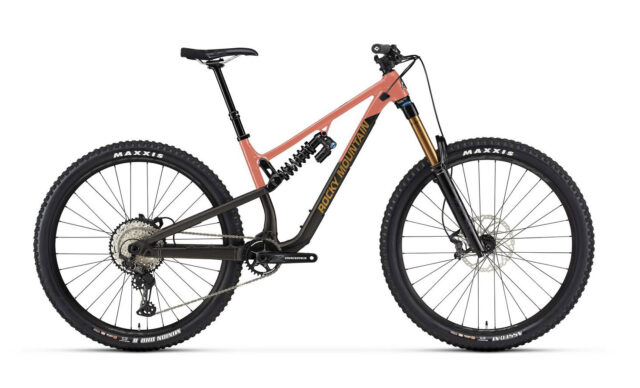
- Front: 170 mm
- Rear: 160 mm
- 27.5” (sizes S & M) or 29” (sizes M-XL)
- Carbon or Alloy
- SM, MD, LG, XL (5’1”- 6’6”/ 155-198 cm)
Rocky Mountain’s Enduro race bike. Updated last year for the 2021 lineup, the Altitude got more travel, now rolls on 27.5” or 29” wheels, got more progressive geometry, and received updated suspension kinematics. Features Ride-9 geometry adjustment system and 10 mm of chainstay adjustment. The “Rally Edition” build kit gets burlier, more downhill oriented components. Check out our Full Review of the Altitude.
More like the Instinct than the Slayer.
Consider If:
- You want a bike that is capable and forgiving on the descents
- You enjoy pushing your limits on steep, chunky terrain
- You race Enduro, like to shuttle to the top of descents, and / or ride lift-served terrain
- You want an Enduro bike, but still want some more trail bike versatility
You Have Better Options If:
- You ride mostly smooth and flat trails
- You are looking for an XC-style bike that climbs very well
- You want more of a freeride-style bike, rather than an enduro racer
- Alloy 30: $3,839 – Best Budget Build
- Alloy 50: $4,739
- Alloy 70 Coil: $5,749 – Most Performance for the Price
- Carbon 50: $6,069
- Carbon 70: $7,669
- Carbon 70 Coil Edition: $7,779
- Carbon 90 Rally Edition: $10,229
- Carbon frameset: $4,049
- Specialized Enduro
- Trek Remedy & Slash
- Pivot Mach 6 & Firebird 29
- Santa Cruz Bronson & Megatower
- Yeti SB150
- Giant Reign 29
- Intense Carbine
- Transition Spire
- Nukeproof Mega
- Devinci Spartan
- Scott Ransom
- GT Force
- Cannondale Jekyll 29
- Forbidden Dreadnought
- Mondraker Superfoxy
- Kona Process X
- YT Capra
- Norco Sight & Range
- Canyon Strive
- Evil The Wreckoning
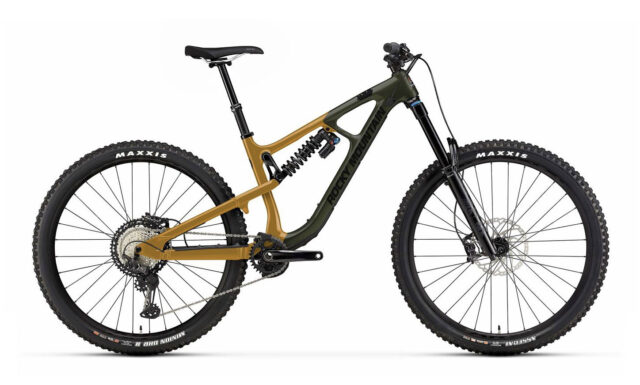
- Front: 180 mm (27.5”), 170 mm (29”), or 200 mm (Park Edition)
- Rear: 180 mm (27.5") or 170 mm (29")
- 27.5” (sizes S & M) or 29” (sizes M-XL)
- Carbon or Alloy
- SM, MD, LG, XL (5’1”-6’6” / 155-198 cm)
Rocky Mountain’s most downhill capable bike. This bike is designed to handle lots of bike park riding and fast, steep, chunky freeride trails and large jumps. The “Park Edition” build is a dedicated DH bike, with a dual-crown fork and DH components. Features Ride-4 adjustment system.
Consider If:
- You want a bike that is capable and forgiving on the descents
- You like to shuttle to the top of descents, and / or ride lift-served terrain
- You enjoy pushing your limits on fast, steep, chunky, and technical terrain
- You ride trails that are steep, fast, chunky, and/or have large jumps
You Have Better Options If:
- You ride mostly smooth and flat trails
- You are looking for an XC-style bike that climbs very well
- You want an enduro racer, rather than a freeride bike
- Alloy 30: $3,759 – Best Budget Build
- Alloy 30 Park Edition: $4,279
- Alloy 50: $4,599
- Carbon 50: $5,539
- Carbon 70: $6,789 – Most Performance for the Price
- Carbon 90: $8,359
- Carbon frameset: $3,239
- Santa Cruz Nomad
- Yeti SB165
- Commencal Clash
- Revel Rail
- Transition Patrol
- Nukeproof Giga
- Canyon Torque
- Mondraker Dune & Dune Carbon XR


